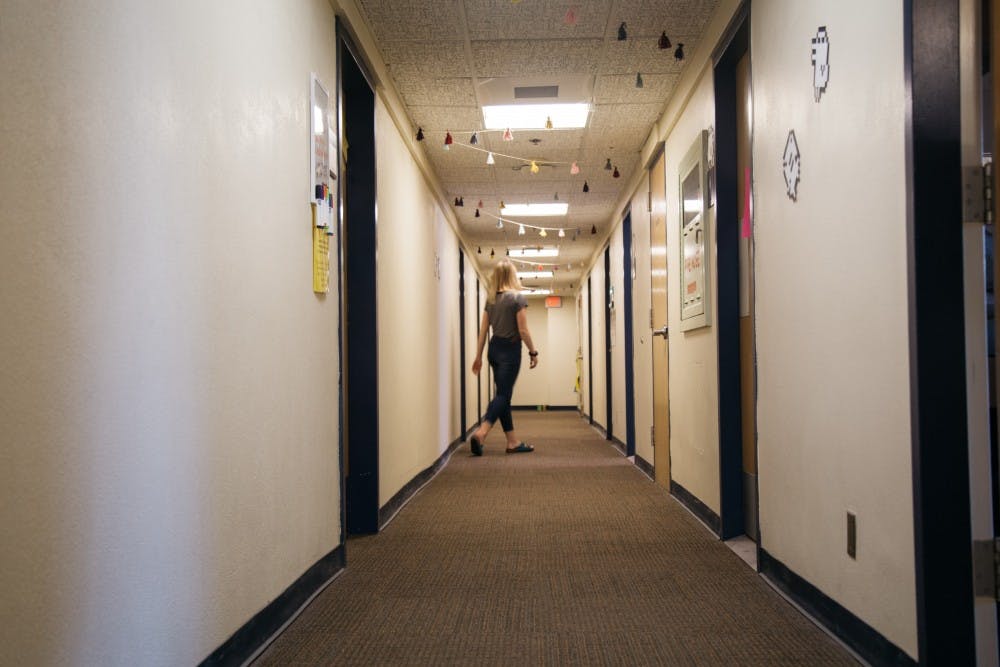University Resident Assistants (RAs) are responsible for organizing community events, knowing resources for students who need them and acting as a resource for students themselves, all while managing their own social lives and work agendas.
From the outside looking in, it’s easy to look at an RA and think, “How do you do it all?” It might seem daunting to imagine, but maybe a part of you is also thinking, “How do I become one myself?”
The RA online application is open now until January 20. However, an online application is not the only step to become an RA.
Haggerty-Tyson hall director Tyler Hale outlined the step-by-step process when applying to become an RA in any residence hall:

1. Choose your hall: Generally students apply to become an RA in their current residence hall because hall directors prefer students who have already lived in that dorm. However, there is a page on the online application which allows the applicant to choose to be considered wherever there is a position available. There is also a check box to be considered for Haggerty-Tyson.
2. Apply: The online application must be completed by Jan. 20, including essay, resume, cover letter, GPA requirement and two references. The Office of Residence Life will look over the GPA requirements and conduct cases.
The minimum GPA requirement is a 3.0; however, there is an application to appeal this requirement through the Office of Residence Life. The two references must be written by someone other than a hall director or an assistant hall director.
3. Get vetted: Applications will be reviewed by the resident’s current hall director and finalists will be notified and brought in for interviews from Jan. 26 to Feb. 3. Hall directors in Haggerty-Tyson will talk with other directors, since the applicants will most likely have lived in underclassmen housing previously, and not in Haggerty-Tyson.
While an applicant can choose to be considered for any hall where there is an RA position, their priority will be their current hall of residence to help build upon the community they formed in the previous year. That hall director will review the application.
4. Interview: Interviews for the application process will take place after the online applications are vetted, and can differ from preference of each hall director. Some interviews may have non-returning RA’s present, but they will all be conducted by the hall director.
Sometimes hall directors will refer select applicants to another residence hall they did not apply for, if they appear to be a better fit for another dorm.
Second floor Fields RA Micaela Snashall was one applicant who was asked to consider switching her desired residence hall.
“Having an open mind and being flexible even if they ask you to change dorms (from what you) originally applied to is really important,” Snashall said. “I had never met Sister Sue, so I had to play on my strengths in my interview.”
5. Get Accepted: According to the Resident Assistant Application Timeline, letters are scheduled to be sent out to applicants on Feb. 10 with the status of their acceptance.
Once you begin the application process, there are some things you can do to set yourself apart from other applicants. Hale gave some words of advice on how to better your chances at becoming an RA:
1. Start talking to current RAs, hall directors and assistant hall directors. Let them know who you are and that you’re interested. As Hale says, “An email goes a long way.”
2. After you gathered and completed the online application materials, take them to the career center to double check everything is in best condition possible.
3. “Don’t take yourself out of the process,” advised Hale. “Sometimes people maybe have a bad interaction, or maybe have a conduct instance that comes up, and they’ll instantly assume it’s not gonna happen and then they spiral. For us, it’s really about how you handle yourself in the hall.”
4. Become active in the hall, whether it’s attending mass or taking on a different leadership role. Being active is part of an RA’s responsibility, which is what hall directors look for.
5. Be gracious when accepting or denying a position. While not everyone will be accepted, Hale says being gracious can increase your chances at receiving the position the following year.
Fourth floor Fields RA Megan Launceford was studying abroad in Salzburg during her skype interview with Fields’ hall director, Sister Sue Bruno. Despite being in another country, Launceford had an equal chance of securing an RA position.
“It’s hard to convey your personality over skype, which is a huge part of the process,” Launceford said. “I tried to make myself seem as human as possible.”
Through all of the stress of applying, Hale said it can be very rewarding to see students finally get their acceptance letter.
“People put their hearts into this, it becomes a very big deal for people and it can be a very tender day when the offers are extended,” Hale said. “I think that what this world needs more of is grace with ourselves. That’s a time when you surround yourself with good friends who can celebrate well or commiserate well with you.”








